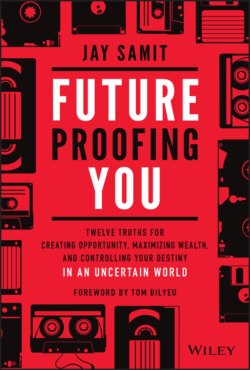Читать книгу Future Proofing You - Jay Samit - Страница 11
How Do So Many Fail in a Land So Rich with Opportunity?
ОглавлениеThere are two reasons most people don't attain wealth: they didn't think they were smart enough to get rich and they were never taught how to create wealth. Let's dispense with the myth about intelligence and money. “There is no relationship between IQ scores and net wealth,” according to Ohio State University economist and research scientist Jay Zagorsky. Zagorsky tracked the progress of 10,000 participants from 1979 to the present.3 While those with higher IQs tended to earn more (each IQ point above average increased earnings from between $202 to $616 per year), smart people weren't any better at holding on to their money and building wealth. Surprisingly, those with higher IQs tended to have more problems. When Zagorsky compared people's IQ scores and their likelihood to have problems such as paying bills, declaring bankruptcy, and defaulting on credit cards, those with the highest IQs were more likely to have financial instability.
What if you didn't get good grades in school? That doesn't matter, either. Standardized tests and rigid curriculums do a poor job of measuring creativity and drive. As we will discuss in later chapters, effort, critical thinking, collaboration, and curiosity are the traits most needed for success. Unfortunately, just like the tethered elephants, too many people internalize failures at school into believing they will fail later in life. Average student Steven Spielberg, the genius director of Jaws, Indiana Jones, E.T., Jurassic Park, and Saving Private Ryan, was rejected twice by the University of Southern California's film school. (Decades later, multi billionaire Spielberg, whose films have grossed more than $9 billion, showed that there were no hard feelings when he donated $500,000 to USC's School of Cinematic Arts.) Even Nobel Laureate and renowned physicist Albert Einstein failed his entrance exam to the Zurich Polytechnic Institute. A recent study of 700 millionaires found that their average GPA was 2.9 out of 4; C students were the most likely to become millionaires.4 Forget about how you did in school. You don't become a success by looking in the rearview mirror.
Believing in your ability to succeed is the key to becoming Future Proof. Self‐perception is more important than any other factor in predicting success. Scientists at Basel University in Switzerland and the University of California analyzed the data of 1,824 people ranging from 16 to 97. “We established that self‐esteem is more likely to influence success than vice versa,” according to psychology professor Ulrich Orth who led the research.5 If you think you can or think you can't, you're right. Self‐made billionaire Larry Ellison dropped out of two colleges before co‐founding Oracle. “I studied everything but never topped,” the world's most successful average student Bill Gates once declared, “But today the toppers of the best universities are my employees.”
Most parents, having spent their lives struggling to make ends meet, encouraged their children to get good, steady jobs and then retire with a pension. In 1950, the average American family income was $3,300 a year and the median home price was $7,354.6 In other words, a house cost a little more than two years' wages. The American dream was within reach of most Americans. In postwar America, companies were adding jobs and the average worker stayed at his job for over 14 years. People felt secure in their work, financially secure about their future, and could send their children to college debt‐free. The greatest generation lived a Future Proof lifestyle. Such a halcyon world is long gone.
